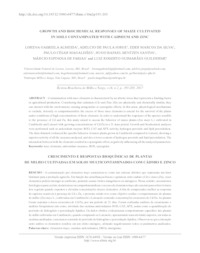Growth and biochemical responses of maize cultivated in soils contaminated with cadmium and zinc.
Growth and biochemical responses of maize cultivated in soils contaminated with cadmium and zinc.
Author(s): ALMEIDA, L. G.; JORGE, A. de P.; SILVA, E. M. da; MAGALHAES, P. C.; SANTOS, H. R. B.; FARIAS, M. E. de; GUILHERME, L. R. G.
Summary: Contamination with trace elements is characterized by an abiotic stress that represents a limiting factor in agricultural production. Considering that cadmium (Cd) and Zinc (Zn) are physically and chemically similar, they can interact with the environment, causing antagonistic or synergistic effects. In this sense, physiological mechanisms to exclude, detoxify or compartmentalize the excess of those trace elements is crucial for the survival of the plants under conditions of high concentrations of these elements. In order to understand the responses of the species sensible to the presence of Cd and Zn, this study aimed to access the behavior of maize plants (Zea mays L.) cultivated in Cambisoils and Latosol with growing concentrations of Cd/Zn in a 21 days period. Growth and biochemical analyzes were performed such as antioxidant enzyme SOD, CAT and APX activity, hydrogen peroxide and lipid peroxidation. The data obtained evidenced the specific behavior of maize plants grown in Cambisoils compared to Latosol, showing a superior activity of all the enzymes analyzed, and also a lower content of hydrogen peroxide and lipid peroxidation. The interaction between both the elements resulted in a synergistic effect, negatively influencing all the analyzed parameters.
Publication year: 2017
Types of publication: Journal article
Unit: Embrapa Maize & Sorghum
Keywords: Bioquímica vegetal, Enzima, Sinergismo
Observation
Some of Embrapa's publications are published as ePub files. To read them, use or download one of the following free software options to your computer or mobile device. Android: Google Play Books; IOS: iBooks; Windows and Linux: Calibre.
Access other publications
Access the Agricultural Research Database (BDPA) to consult Embrapa's full library collection and records.
Visit Embrapa Bookstore to purchase books and other publications sold by Embrapa.

